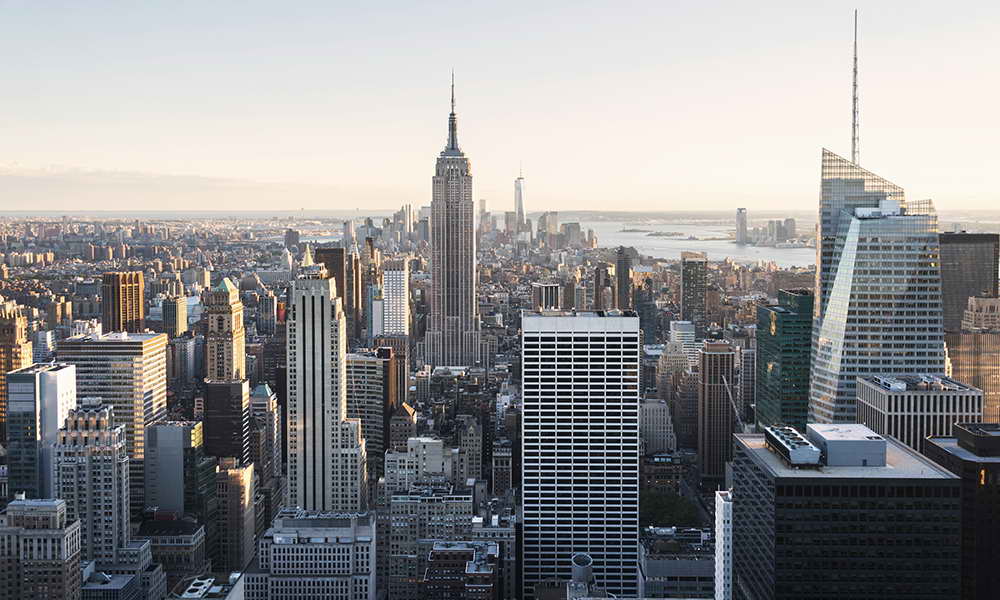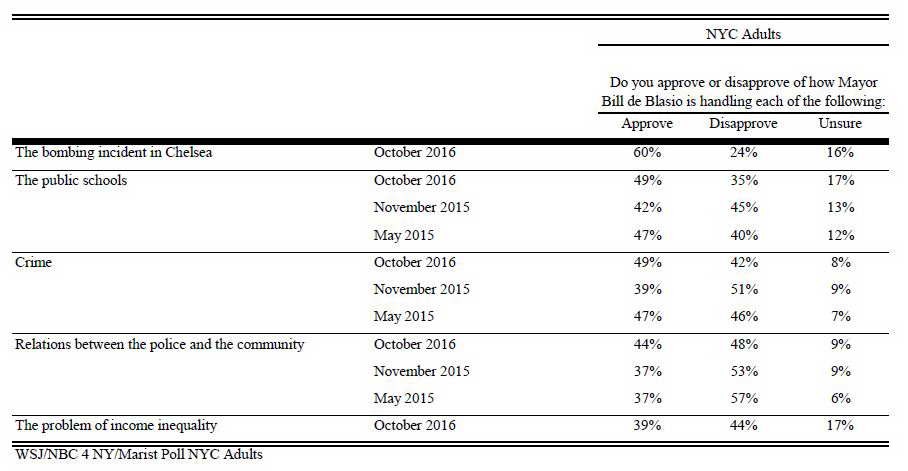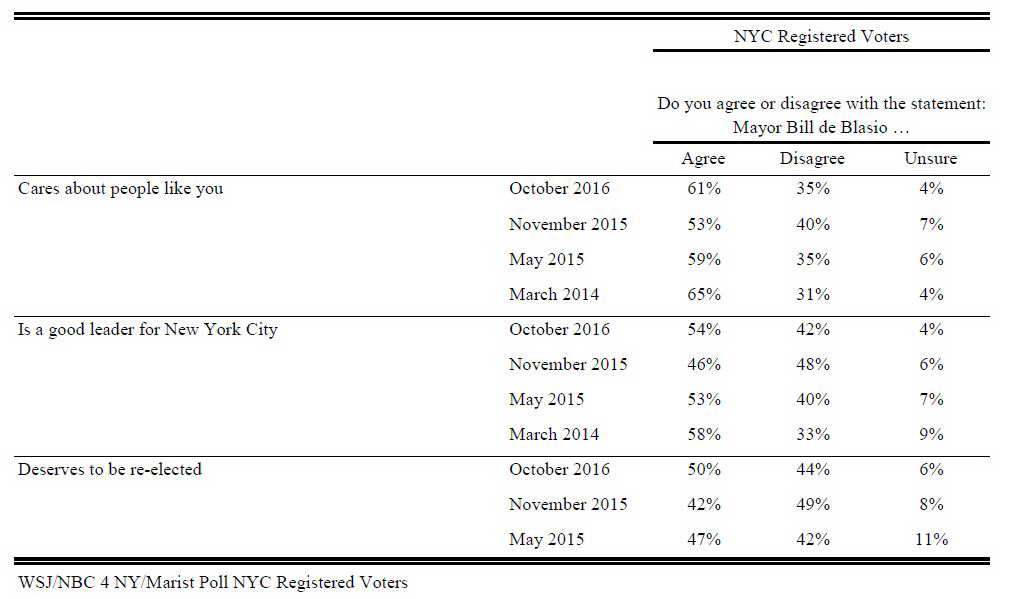October 6, 2016
10/6: Mayor de Blasio Approval Rating up to 40%
NBC 4 NY/WSJ/Marist New York City Poll
With a mayoralty election year approaching, New York City Mayor Bill de Blasio has a job approval rating of 40%, up from his all-time low of 35% in April. A year ago, the mayor’s approval rating stood at 38%. However, a deep racial divide underscores both de Blasio’s approval rating and questions pertaining to the general condition of New York City.
“Mayor de Blasio’s approval rating has inched up, and he has improved his standing with New Yorkers on both his handling of issues and their perceptions of his qualities as mayor,” says Dr. Lee M. Miringoff, Director of The Marist College Institute for Public Opinion. “New Yorkers give the mayor his top grade for his handling of the recent bombing incident in Chelsea.”
Four in ten registered voters in New York City, 40%, approve of how Mayor Bill de Blasio is doing his job. This includes 9% who give the mayor an excellent rating and 31% who give him a good one. 56% of voters citywide report de Blasio is doing either a fair, 34%, or poor job, 22%, in office. Three percent are unsure.
Prominent differences surface when looking at race. African American voters, 53%, and Latino voters, 46%, are more likely than white voters, 30%, to give de Blasio high marks. While de Blasio’s approval rating has changed little among white voters, his score has inched up from 49% in April among African American voters. Mayor de Blasio has made significant inroads with Latino members of the electorate. In the spring, 36% of Latinos reported Mayor de Blasio was performing well in his post.
By borough, de Blasio’s job performance is best received in the Bronx, 49%, up from 34% previously. In Brooklyn, 45% of voters think well of how Mayor de Blasio is doing his job compared with 38% who shared this view this past spring. 43% of Manhattan voters think highly of de Blasio’s job performance, up 11 points since April. Mayor de Blasio’s approval rating in Queens and Staten Island is little changed. 31% currently score the mayor’s job performance highly compared with 32% who did so previously.
On the specifics of the mayor’s job performance, he receives his highest score among city residents on how he handled the bombing incident in Chelsea with a 60% positive rating. The mayor also receives good marks on how he is handling crime, 49%, and how he is dealing with the city’s public schools, 49%. 60% of households with a child in the public schools approve of how de Blasio is approaching education. On the issue of police-community relations, de Blasio’s score is upside down. 44% of adults citywide approve while 48% disapprove. The mayor also has a net negative rating on how he is handling the problem of income inequality. 39% of city residents approve while 44% disapprove.
On questions for which trend data exists, Mayor de Blasio’s approval rating on the issues has increased. This includes the question about police-community relations which, as noted above, the mayor currently still receives a net negative score.
African American adults and Latino residents are more likely than white residents to approve of how Mayor de Blasio is approaching these issues with one exception. On the question of how Mayor de Blasio tackled the Chelsea bombing incident, similar proportions of whites, 59%, and Latinos, 57%, think well of how the mayor handled the situation. 71% of African Americans agree. Of note, de Blasio’s scores on the questions for which trend data exist have increased even among white adults citywide.
Mayor de Blasio is viewed by registered voters to be a mayor who cares about the average person, 61%, who is a good leader for New York City, 54%, and who deserves to be re-elected, 50%. On each of these questions, more voters citywide maintain these opinions than previously. Again, African American voters and Latino members of the electorate are more likely to perceive de Blasio positively than white voters. While there has been little or no change among white voters on these questions, there has been an increase in African American and Latino voters who have a positive impression of de Blasio in each of these areas.
Since Mayor de Blasio has taken office, few New York City residents believe that he has improved the homeless situation in New York City. Only 10% of residents think the number of homeless people, panhandlers, and the mentally ill on the city’s streets and subways have decreased. 38% believe the number has increased, and 43% say it has remained about the same. Nine percent are unsure. When this question was reported last November, 8% thought the number of homeless people in New York City had gone down, 42% thought the homeless population had grown, and 42% said it had remained the same. Eight percent at that time were unsure. Currently, white residents, 53%, are more likely than African American, 25%, and Latino, 37%, adults to say the homeless situation has become worse. Still, a majority of African Americans, 54%, and a plurality of Latinos, 43%, say it has remained about the same. Just 14% of African American residents and 12% of Latinos report the number has decreased.
Mayor de Blasio does better on the issue of affordable housing. More than one in four residents, 27%, say the amount of affordable housing in the city has increased. 21% think it has decreased, and 41% report it is unchanged. 11% are unsure. Here, too, opinions splinter along racial lines. Latino adults, 38%, and African American residents, 29%, are more likely than whites, 19%, to believe there is greater access to affordable housing.
Overall, 43% of voters in New York City, up from 37% previously, think Mayor de Blasio is changing New York City for the better. 25% say he is having a negative effect on the city, and 28% report the mayor is not having any effect on the five boroughs. There has been little change among white voters, 26%, who see improvement compared with 29% last fall. However, a substantial proportion of Latino voters, 53%, up from 37%, say de Blasio is improving the city. The proportion of African American voters is also up, 59% from 52%.
Mayor de Blasio and New York Governor Andrew Cuomo often disagree about the issues facing the city. A majority of city residents, 51%, say those disagreements matter only a little, 28%, or not at all, 23%. 46% say they are bothered a great deal, 28%, or a good amount, 18%, by such squabbles.
Who do New York City residents blame for the disagreements between de Blasio and Cuomo? 42% put more of the onus on Cuomo while 30% point a finger at de Blasio. Nearly three in ten, 29%, are unsure. Again, racial differences exist. A majority of African American residents, 52%, and a plurality of Latino adults, 44%, mostly blame Cuomo. A plurality of white adults, 41%, say the fault lies mostly at de Blasio’s feet.
Pluralities of New York City residents think both Mayor de Blasio and Governor Cuomo are taking steps to clean up corruption in the city and state, respectively. 47% of city residents report de Blasio is attempting to rid the city of corruption while 32% assert that he and his administration are adding to this problem in the Big Apple. 21% are unsure. When it comes to Cuomo, nearly identical proportions have these views. 47% think Cuomo is taking steps to clean up corruption in state government while 33% believe he and his administration are adding to the problem at the state level. 21% are unsure.
On both questions, African Americans and Latinos are more likely than whites to think de Blasio and Cuomo are trying to eliminate corruption. A plurality of white voters, 46%, think de Blasio is adding to corruption in New York City. There is little consensus among white voters about Cuomo: 40% think he is trying to rid Albany of corruption, and 38% report he is adding to the problem. 21% of whites are unsure.
What are de Blasio’s re-election chances? If he faces a primary challenge, 42% of New York City Democrats support de Blasio. Former New York City Council Speaker Christine Quinn receives the support of 12%. New York City Comptroller Scott Stringer has 9% as does Bronx Borough President Ruben Diaz Jr. Congressman Hakeem Jeffries receives the support of 7% of New York City Democrats. More than one in five, 22%, are undecided.
Looking at race, a majority of African Americans who are Democrats, 56%, and half of Latinos who are Democrats, 50%, support Mayor de Blasio. Among white Democrats, 26% are for de Blasio, 20% support Quinn, and 19% back Stringer.
“What is noteworthy, at this point, is that de Blasio has a substantial lead over a crowded field of potential Democratic opponents, and he has an impressive 57% re-elect score among Democrats,” says Dr. Lee M. Miringoff, Director of The Marist College Institute for Public Opinion. “Citywide, 50% of registered voters now say the mayor deserves to be re-elected, up eight points from the previous poll.”
In a general election contest against Republican real estate executive Paul Massey, Mayor de Blasio, 64%, leads Massey, 22%, by nearly three to one among registered voters in New York City including those who are undecided yet leaning toward a candidate. Three percent support someone else, and 11% are undecided.
De Blasio has the advantage over Massey in all five boroughs. Mayor de Blasio does best in the Bronx, 73%. His weakest region is in Queens and Staten Island where he has the backing of 56%. African American, 87%, and Latino voters, 72%, overwhelmingly favor de Blasio. Among whites, de Blasio, 45%, is ahead of Massey, 38%, by seven points.
Do city voters want a Trump family member to enter New York City’s political arena? Eight in ten voters, 80%, say they do not want Donald Trump, Jr. to run for mayor. A similar 81% say they do not want Donald Trump’s daughter Ivanka Trump to seek the mayoralty.
Turning to the New York City Police Department, 68% of New York City residents have either a great deal of confidence, 28%, or a fair amount of confidence, 40%, in police officers in their community to protect them from violent crime. 30% either have just some confidence, 14%, or very little confidence, 16%, to keep them safe. Two percent are unsure. In November 2015, 66% of residents had, at least, a fair amount of faith in the NYPD to protect them. Currently, 80% of white adults, compared with 53% of African American residents and 65% of Latino adults, feel confident that the police in their community will protect them, at least, a fair amount.
70% of adults have either a great deal, 32%, or a fair amount, 38%, of confidence in their local police to protect them from an act of terrorism. 28% have just some, 14%, or very little, 14%, faith in the NYPD to do so. Two percent are unsure.
Optimism about the direction of New York City has increased. 48% of registered voters, compared with 43% in April, say the city is moving in the right direction. 43%, down from 51% previously, say it is moving in the wrong one. The proportion of voters who are more upbeat about the city’s trajectory has been growing. Last year, 38% of the city’s electorate said the city was on the right track while 55% reported it was on the wrong one.
Complete October 6, 2016 The Wall Street Journal/NBC 4 New York/Marist Poll NYC Release and Tables



